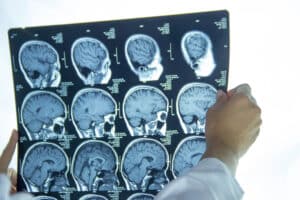
HIV and AIDS can cause neurological damage in several ways, leading to brain damage. Keeping your viral load under control by taking and remaining on medication is the best way to reduce the risk of neurological complications.
Thanks to treatments now available, severe acquired brain injuries are much less common today than 30 years ago. Nevertheless, about half of all people with AIDS still develop some neurological problems related to the virus, according to Johns Hopkins Medicine. Doctors sometimes describe this as HIV-associated neurological disease or HAND. HAND can affect cognitive abilities, memory, mood, and physical functioning.
How Do HIV and AIDS Cause Brain Damage?
HIV, particularly as it advances to AIDS, can cause acquired brain injuries (ABIs) in several ways. The virus causes inflammation of many parts of the body, damaging nerve cells in the central nervous system and brain. Damaged nerve cells can lead to the symptoms of brain damage.
By taking your antiretroviral medications and other maintenance drugs prescribed by your doctor, you can reduce the risk of developing severe neurological complications related to your HIV diagnosis. In the past, however some medications used to reduce the viral load of a patient with HIV or AIDS also caused neurological issues in some patients.
Other Ways HIV and AIDS Affect Your Brain
There are also different ways you can acquire a brain injury related to HIV or AIDS. Primarily, this occurs because of complications of the disease. For example, some cancers are more common in people with compromised immune systems and lesions related to these cancers can cause brain damage.
Additionally, some people with untreated, advanced disease suffer from a condition known as HIV-associated dementia or AIDS dementia complex. They struggle with impaired cognitive functioning, thinking clearly, understanding what is happening around them, and memory problems.
Symptoms HIV and AIDS-Related Brain Damage
If HIV and AIDS are causing you or a loved one to suffer a brain injury, neurological symptoms may begin to appear. Many of these symptoms are mild at first and do not advance if the virus is kept under control.
Symptoms include:
- Forgetfulness and confusion
- Weak feeling
- Significant changes in behavior, acting “out of character”
- Headaches
- Issues with balance, coordination, and mobility
- Seizures
- Changes in eyesight or hearing
- Sudden trouble swallowing
- Unexplained problems controlling heart rate or blood pressure
- Loss of bladder or bowel control
- Changes in sensation, including losing feeling in your extremities
- Anxiety and depression, or other unexplained mental health problems
If you live with an HIV or AIDS diagnosis and you experience any of these symptoms, you should see your doctor right away. Ensuring your viral load is well under control and you remain on the proper medications is the best way to prevent permanent brain injuries.
Treatment and Prevention of AIDS-Related ABIs
In general, once you suffer brain damage related to HIV or AIDS, there is no way to recover that neurological function. The best option is to prevent it in the first place by taking antiretroviral medications. These medications have helped people with HIV and AIDS live decades longer today than they lived 25 years ago. These medications keep your viral load down and lower the risk of damage to your brain and nervous system.
If brain injury occurs because of a complication of your HIV or AIDS, you may need to undergo additional treatment. In some cases, it may be possible to reverse symptoms of brain fog or impairment with the right treatment which could include:
- Treating cancer with surgery, chemotherapy, and/or
- Treating bacterial infections with antibiotics.
- Taking medications to fight viruses when possible.
- Going to counseling and taking antidepressants to counter mental health concerns.
Working closely with your doctor is the best way to avoid and limit AIDS acquired brain injury. We recommend reporting any symptoms to your doctor and seeking treatment as soon as possible.
Recovering Compensation for an AIDS-Related ABI
Because the regimen of antiretroviral drugs plays such a key role in preventing brain damage and other complications of HIV and AIDS, getting an accurate diagnosis and receiving the right medications as soon as possible is imperative. If there was a delay in your diagnosis, or if you received an incorrect diagnosis, you may be able to pursue compensation through a medical malpractice claim.
At Newsome | Melton, our personal injury attorneys are standing by waiting to hear from you. We will review your case for free. We can protect your rights and pursue the compensation you deserve. With more than 20 years of handling brain injury cases, we know what it takes to win. Let us go to work for you.
Someone from our team is available to talk with you 24 hours a day. Call (800) 917-5888 to get started.
